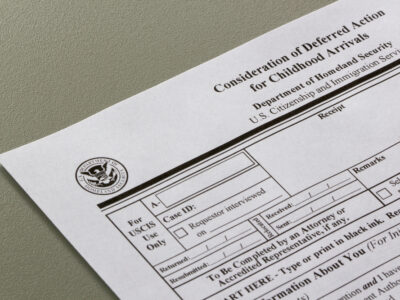If you are a U.S. citizen, regardless of whether you were born in the United States or in another country, you may want to bring your fiancé to the United States to get married. With the necessary knowledge, legal support, and guidance, you can achieve this and then work on getting your new spouse’s permanent residency arranged, which would enable you to build a future in California.
There are two ways to help your loved one join you in America and become a permanent resident. You must follow specific procedures and meet particular requirements, depending on whether you plan to marry here or wed outside of the United States and then return to apply for residency for your new spouse.
Your Options for Bringing a Fiancé or Spouse to the U.S.
For a non-U.S. citizen to marry a U.S. citizen and obtain permanent residency, the available options are twofold:
- K-1 Fiancé Visa (Marriage in the U.S.)
- You can apply for a fiancé visa (Form I-129F Petition for Alien Fiancé) that will allow your fiancé to enter the country.
- Once approved, your fiancé can stay for 90 days, during which the marriage ceremony must occur in the United States.
- Following the wedding, your new spouse may file Form I-485, Application for Adjustment of Status, to become a permanent resident (Green Card holder).
- He or she can remain in the U.S. while officials process the application, even if the 90-day period has expired.
- Marriage Abroad (CR1/IR1 Visa via Consular Processing)
- An alternative method is for you to travel to your fiancé’s country and get married there.
- The two of you can then return to the United States as a married couple.
- For your new spouse’s status to be legal, you must file a Petition for Alien Relative (Form I-130), which leads to a CR1 or IR1 marriage visa.
- After approval, your spouse will enter the U.S. as a lawful permanent resident.
What Are the Requirements for Eligibility to File a Fiancé Petition?
To start such a quest, you must be a U.S. citizen, and you will have to indicate that on your petition, along with the following:
- An undertaking that you intend to marry your fiancé within 90 days of his or her entry into the United States
- A declaration that both of you are legally free to marry
- A statement that you and your fiancé met within the two years before this petition (exceptions that might waive this requirement are available under U.S. immigration law).
Additional requirements include:
- Proof of your relationship (photos, communication records, travel evidence)
- Proof of U.S. citizenship (passport, birth certificate, naturalization certificate)
- Meeting the financial sponsorship requirement (Form I-864, Affidavit of Support)
What Happens if the Engagement Ends?
You may not be able to make the necessary arrangements within the allowed 90 days, or you may simply decide not to go ahead with the marriage. In the event you decide not to proceed with your engagement, your fiancé will have to leave the United States before the 90-day period expires.
If they remain in the country, it will be a violation of U.S. Immigration Law, which could affect any future efforts to seek U.S. immigration benefits.
Costs, Timelines, and Common Pitfalls
Government Fees (subject to change):
- Form I-129F (Fiancé Petition): approx. $675
- Form I-485 (Adjustment of Status): approx. $1,440
- Form I-130 (Relative Petition): approx. $625
Processing Times:
- K-1 Fiancé Visa: 6–12 months on average
- CR1/IR1 Spousal Visa: 10–18 months on average
Common Reasons for Denial:
- Lack of genuine relationship evidence
- Not meeting the in-person requirement
- Previous immigration violations or inadmissibility grounds
- Missing deadlines or incomplete paperwork
Can My Fiancé’s Children Come With Us?
Yes. If your fiancé has children under 21 years old and unmarried, they may qualify for a K-2 visa (if applying under a K-1 visa) or as derivative beneficiaries (if applying under a CR1/IR1 spousal visa).
Employment, Work Authorization, and Status in the U.S.
- During the K-1 visa period: Your fiancé may apply for a temporary work permit (EAD) while waiting for adjustment of status.
- After Green Card approval: Your spouse becomes eligible to live and work permanently in the U.S.
Local Advantage: California Immigration Attorneys Who Understand You
You will likely find comfort knowing that legal guidance and support are available in your language. You can seek the support and guidance of an experienced California immigration attorney who is an immigrant himself. His ability to communicate in Sinhala, Tamil, Gujarati, Hindi, and Urdu may help you with understanding the laws, eligibility requirements, and more.
At Hussain & Gutierrez, our immigration lawyers guide you through every step — from filing your fiancé visa petition to adjustment of status after marriage. We understand both the legal and emotional aspects of uniting families, especially in multicultural communities across Southern California.
Frequently Asked Questions
What is the difference between a fiancé visa and a marriage visa?
A fiancé visa (K-1) requires you to marry in the U.S. within 90 days, while a marriage visa (CR1/IR1) is for couples who marry abroad before applying for entry.
How long does it take to get a fiancé visa?
On average, between 6–12 months, depending on USCIS processing times and consular backlogs.
Can my fiancé work immediately after arriving in the U.S.?
Not immediately. They must apply for a temporary work permit (EAD) while waiting for approval of their permanent residency.
What happens if my fiancé overstays the 90-day period without marriage?
It will be considered a violation of U.S. immigration law, which can negatively impact future immigration applications.
Do I need an immigration lawyer for a fiancé visa petition?
While not mandatory, having an experienced attorney helps avoid mistakes, strengthens your petition with evidence, and reduces the risk of delays or denials.
If you are planning to bring your fiancé to California and need clear guidance on visa requirements, documentation, and eligibility, the attorneys at Hussain & Gutierrez are here to help.
We offer personalized, multilingual immigration support to families throughout Los Angeles and beyond. Contact Hussain & Gutierrez today to schedule a consultation and take the first step toward uniting with your loved one in the United States.



